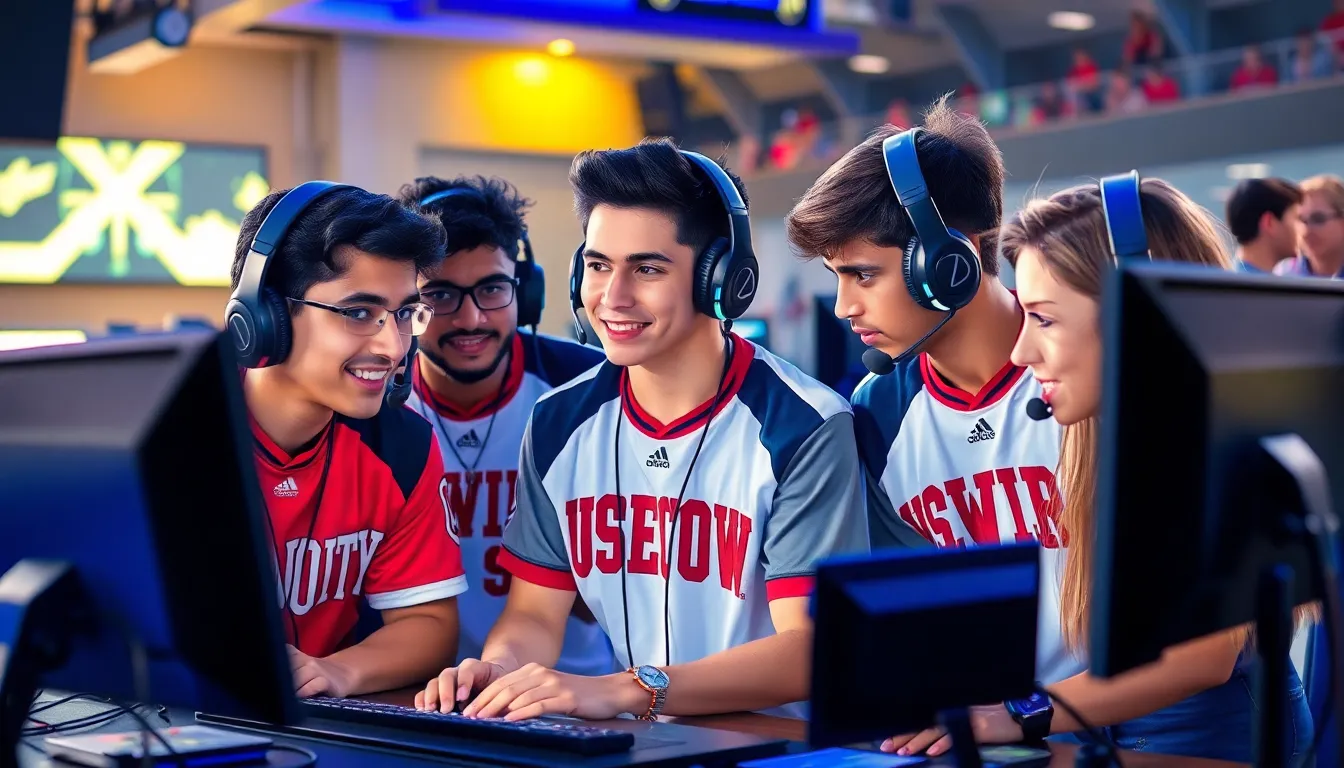The Best Fluffy Pancakes recipe you will fall in love with. Full of tips and tricks to help you make the best pancakes.

Colleges with Esports Teams: Unlocking Scholarships and Career Opportunities
In a world where gaming isn’t just a pastime but a competitive sport, colleges are stepping up their game with esports teams. Imagine trading your textbooks for gaming gear while still earning a degree—sounds like a dream, right? These institutions are not just embracing the digital revolution; they’re turning it into a full-blown collegiate experience that combines passion with education.
Colleges With Esports Teams
Esports has gained significant traction in colleges across the United States. Many universities now offer competitive gaming programs, recognizing the potential for student engagement and skill development. Teams compete in various games such as League of Legends, Overwatch, and Valorant, attracting players who excel in these competitive environments.
Schools have adopted esports to enhance their athletic programs. Participation in esports fosters teamwork, strategy, and communication skills among students. Academic institutions invest in specialized facilities to support training and competitions, creating spaces that mirror professional gaming arenas.
Scholarships specifically for esports players have emerged. These financial incentives encourage talented gamers to pursue higher education while competing at a high level. Colleges often host tournaments, which elevate campus spirit and provide networking opportunities for participants and spectators alike.
Esports competitions receive publicity through live broadcasts and streaming platforms. Viewers can access matches online, enhancing the visibility of participating colleges and attracting prospective students. Engaging with esports offers an alternative avenue for academic performance validation outside traditional sports.
Students benefit from the blend of academics and gaming. Many institutions provide resources for balance between study and competition, ensuring that players maintain their academic standing. Faculty members often support esports initiatives, seeing them as viable pathways for career development in the growing esports industry.
Overall, the rise of esports in colleges reflects broader societal changes, presenting new opportunities for education and personal growth. Institutions recognize the importance of adapting to student interests, making esports an integral part of campus life.
Benefits of Joining Esports Teams

Esports teams offer a range of benefits for students, enhancing both their academic and personal experiences. Engagement in gaming competitions leads to significant skill development.
Skill Development
Collaboration is vital in esports, as students learn to work effectively within a team. Problem-solving becomes second nature during intense gameplay, sharpening analytical skills. Leadership skills emerge when players take on roles to strategize and guide their teammates. Communication improves, fostering clear dialogue in high-pressure situations. Time management also receives a boost, as balancing practice schedules with academic responsibilities reinforces prioritization. Emotional resilience is built through handling wins and losses, equipping students with vital coping mechanisms for future challenges.
Scholarships and Financial Aid
Scholarship opportunities are increasingly available for talented gamers, providing financial assistance for college. Many universities recognize the potential of esports and offer funds to attract skilled players. Competitive gaming programs can reduce tuition costs, making higher education accessible. Additionally, esports scholarships may cover equipment and resource expenses, enabling students to focus on their performance. Some institutions even offer stipends or support for travel during tournaments, further easing financial burdens. This financial aid creates pathways for students to pursue their passion for gaming while managing educational expenses effectively.
Top Colleges with Esports Teams
Many colleges nationwide now feature specialized esports teams. Students engage in both competitive gaming and academics, balancing their passion and studies.
Prominent Programs
The University of California, Irvine, leads the way with dedicated esports facilities and scholarships. Other institutions, like Texas A&M University and Michigan State University, boast strong programs, attracting top-tier talent. The University of Utah stands out with its emphasis on research in gaming, contributing to curriculum development. Notably, the varsity esports program at Maryville University has achieved national recognition for its success. Institutions actively enhance infrastructure, creating environments that mimic professional stages.
Notable Achievements
Collegiate esports teams earn significant accolades in tournaments each year. University of California, Irvine, captured the 2021 League of Legends Championship. Texas A&M University also secured national titles in multiple games, showcasing skilled players. Moreover, the University of Utah continues to perform well in competitive rankings. Scholarships support talented gamers, helping them pursue education while excelling in gaming. With growing recognition, these institutions foster skill development, preparing students for potential careers in the esports industry.
How to Choose the Right College for Esports
Choosing the right college for esports involves considering several critical factors. Evaluating schools that align with personal goals and interests matters significantly.
Location and Facilities
Proximity to home or major cities often plays a vital role in the decision-making process. Many colleges feature state-of-the-art facilities that enhance the gaming experience. Access to gaming arenas, comfortable practice spaces, and the latest technology equips students for success. Institutions like the University of California, Irvine provide specialized esports labs that mimic professional environments. Other colleges may also have dedicated streaming areas for broadcasting competitions. An appealing campus location may boost overall student life and foster community engagement.
Team Culture and Support
Supportive team dynamics significantly influence the collegiate esports experience. Finding colleges that prioritize team culture can enhance collaboration and camaraderie. Strong mentorship from coaches can cultivate individual skills and foster personal growth. Some schools emphasize teamwork, leading to a nurturing environment for new players. Institutions with well-established esports programs often have active alumni networks that provide ongoing guidance and opportunities. Seeking colleges with an engaged community dedicated to success inspires players to push their limits.
Future of Esports in Higher Education
The future of esports in higher education presents significant growth opportunities. Colleges are increasingly recognizing the value of esports not only in entertainment but also in skill development. Opportunities in curriculum development and career pathways are rapidly expanding, as esports becomes a key component of educational programs.
Investment in specialized facilities is on the rise. Colleges are building state-of-the-art esports arenas that mimic professional environments, enhancing student engagement and competitiveness. These investments signal a commitment to fostering talent in a burgeoning industry.
Scholarship offerings for esports athletes are becoming more accessible. Financial aid can cover tuition, equipment, and travel expenses for competitions, alleviating financial burdens on students. Many institutions are linking scholarship opportunities directly to gaming performance, ensuring that talented players receive necessary support.
Networking opportunities associated with esports competitions are increasing. Events often feature live broadcasts and streaming, allowing students to showcase their skills to a broader audience. Exposure to industry professionals during competitions aids in creating valuable connections for career advancement.
Competitive gaming promotes essential life skills. Participation in esports teaches teamwork, strategic thinking, and effective communication. Colleges are emphasizing these skills as vital components of a well-rounded education.
The engagement in esports aligns with modern educational values. Academic institutions are starting to integrate gaming into traditional curricula, providing students with diverse learning experiences. Faculty support for esports programs underscores their significance in creating viable career options.
Colleges with established esports programs continue to lead the way. Institutions like the University of California, Irvine and Texas A&M University are examples of successful models. These colleges highlight how esports can merge academic rigor with a passion for gaming, shaping a promising future for students and the industry alike.
Conclusion
The integration of esports into college life is reshaping the educational landscape. As students embrace competitive gaming alongside their academic pursuits, colleges are responding with dedicated programs and resources. This evolution not only enhances student engagement but also equips them with valuable skills for their future careers.
With growing scholarship opportunities and state-of-the-art facilities, institutions are making esports a viable pathway for many. The rise of esports teams fosters a unique blend of teamwork and strategic thinking, essential traits in today’s job market. As colleges continue to invest in this dynamic field, the future looks bright for students passionate about gaming and education.
